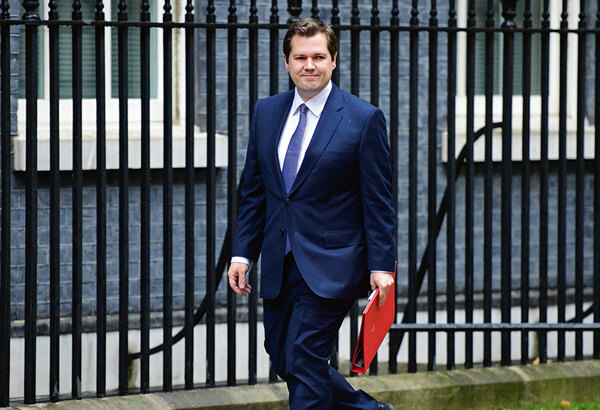The new kid on the block: we meet the housing secretary Robert Jenrick
Robert Jenrick’s rise to the cabinet has come in double-quick time. Three months into his new role, Jack Simpson sits down with the housing secretary to see how he is settling in. Photography by Peter Searle
The rise of Robert Jenrick has been rapid. It was only in 2014 that he became MP for Newark in a by-election. To join the cabinet five years later is the kind of trajectory most can only dream of.
The cabinet role he has been handed is the housing brief, and Inside Housing sits down with him, three months into his new role. The housing secretary is still getting used to the volume, and variety, of issues that arrive in his inbox.
“You get a huge amount of emails and tweets, from the most pressing national issues to individual planning applications,” he says, as we meet in his Commons office.
It has been a busy day already. The Queen’s Speech that took place hours before our meeting put forward a bill to overhaul the country’s building safety regime.
The bill will implement all 53 of Dame Judith Hackitt’s recommendations following the Grenfell fire, and goes further, including the introduction of a building safety regulator.
Mr Jenrick is keen not to waste time in bringing in these changes, telling us that building safety is something that “genuinely gives him sleepless nights”.
“There is a great deal more we need to do to ensure we have a building safety system that people can trust and rely on,” he says, admitting that this needs to happen more quickly than before.
The reforms will give the regulator power to enforce criminal sanctions against those who breach standards.
“It will be the most significant piece of legislation for building safety and the construction industry in my lifetime,” Mr Jenrick adds.
His lifetime is relatively short when compared with cabinet colleagues. Born in 1982, he is just two years older than the modern system of building regulation, which came into effect in the Building Act 1984. This makes him the first cabinet minister to be born in the 1980s.
Taking over as housing secretary in this era means answering plenty of questions about building safety.
But he is clear that the primary responsibility for fixing these issues lies with building owners.
“We have given £600m for [aluminium composite material] cladding because expert advice suggests those are the most problematic. Beyond that it is the responsibility of building owners,” he says. “There is no excuse for anybody to delay that work and put tenants in an unsafe situation.”
The issue appears to be growing. Last week, a letter from Labour MP Matthew Pennycook warned that “hundreds of thousands” of leaseholders are potentially unable to sell their homes due to concerns about the fire safety of their buildings.
“If any building owner drags their feet unnecessarily [over cladding], I will begin naming them this autumn”
Mr Jenrick says his department is working on a solution, adding that he wants to create a system where each building has one document setting out fire safety performance which could be shared with owners when they sell.
But for those living in buildings with dangerous cladding, the wait for remediation goes on. While deadlines for building owners to remove it have been given (the end of the year for social blocks, June next year for private blocks), the chance of them being hit looks increasingly unlikely.
Mr Jenrick says this is unacceptable, particularly after the taxpayer agreed to give £200m towards the remediation effort. But his ideas for how to speed the process up remain thin – as he repeats the line issued by his predecessor James Brokenshire.
“If any building owner drags their feet unnecessarily, I will begin naming them this autumn and will consider any other steps necessary to enforce and encourage applications,” he says.
Building safety aside, what is Mr Jenrick’s philosophy on housing? Across his office are a number of pictures, including one of him and former prime minister David Cameron. And there are similarities between the approach of both men.
Mr Cameron always placed emphasis on shared ownership as an affordable housing product of choice; and the expansion of the tenure is a key priority for Mr Jenrick.
“It has been around for 40 years since it was introduced… but it hasn’t become as mainstream as envisaged or I would like it to be,” he says, explaining his reforms.
His proposals come in two strands. First, to make shared ownership more attractive, including allowing owners to staircase in chunks of 1%. Second, to give tenants the chance to become shared owners of their housing association homes.
The latter, which could see tenants buy shares for as little as 10%, has been controversial. Some in the sector have labelled it “ill thought out”, while concerns over how it might impact associations’ ability to borrow have also been raised.
“Other [councils], which despite having campaigned for as long as I remember [for borrowing freedom], haven’t stepped up”
Mr Jenrick plays down these fears and says he has spoken with bosses from a “number of big banks” that lend to the sector to discuss how it would apply to existing social stock.
He explains: “Banks are routinely lending to housing associations which have up to 50% of their new stock as shared ownership and between 15% to 30% of historic stock as shared ownership, so it doesn’t seem, to me, that a small increase on the number of properties subject to shared ownership is likely to make a material difference to how housing associations can borrow.”
He is keen to stress that social rent is still part of his funding plans.
This follows concern that Boris Johnson was moving away from the renewed focus on social rent established by predecessor Theresa May.
When asked if homeownership was his sole priority, he is quick to say no, underlining that his priority is to “build more homes of all tenures”.
Nevertheless, he does admit he believes that most people want to own their own home and says he is driven by the Conservatives’ “moral mission” of increasing ownership rates.
For those social rent homes that will be built, Mr Jenrick clearly sees councils as key to delivering them – although he feels progress is mixed.
“Some councils have done magnificently [with] strong plans. Others, despite having campaigned for as long as I remember [for borrowing freedom], haven’t stepped up,” he says.
Last week, Inside Housing published exclusive data that revealed councils were planning to quadruple their housebuilding ambitions, with new Housing Revenue Account freedoms a significant driver.
However, the scale of these plans was put into doubt last week as the Treasury revealed it would increase the rate of borrowing through the Public Works Loan Board by 1%. The Local Government Association has estimated that the changes could cost councils £70m and put capital projects in danger.
“This only takes the rate back to 2018 levels, which is still extremely competitive – I would be cautious of overstating the impact,” he says.
“[Housing associations] are independent organisations, and they will need to make their own financial decisions and be responsible for how indebted they’ve become”
What about grant rates more generally? The housing secretary says he is currently in discussions with chancellor Sajid Javid over a “strong successor” to the £9bn Affordable Homes Programme, with details to come in the Spending Review next year.
For housing associations in London, support is needed in the shorter term, with some slowing down development plans amid Brexit uncertainty and escalating fire safety costs.
L&Q, Notting Hill Genesis and Clarion have all made significant changes to development plans, and have called on government to increase grant rates to keep building the affordable homes the city needs.
But judging by Mr Jenrick’s comments, this looks unlikely. When asked how he was supporting these organisations to keep building, he says “ambitious planning reforms” would give developers confidence and investment in infrastructure would help, too.
When pushed on what specific support there would be, he says: “They are independent organisations, and they will need to make their own financial decisions and be responsible for how indebted they’ve become.
“They need to be responsible players and as organisations have to make their own choices on the homes that they build, government can’t tell them how many homes.”
These comments may not go down too well among housing associations which were expressly ordered to take on more debt to compensate for government cuts to grant in 2010.
The fear in the sector is also that the current challenges could get worse in the event of a no-deal Brexit. Sadiq Khan has said London would need an emergency £5.2bn grant package to survive.
Again, Mr Jenrick makes no specific commitment but he does say a no-deal Brexit would spark a “fiscal event”, where the chancellor will bring forward measures to boost the economy and support specific sectors where it might need to intervene in.
“Housing is one of those strategic industries,” he says. “The housing market and construction industry is one of the strategic sectors of the economy that my department and the Treasury have worked closely on, to ensure that it could manage a no-deal Brexit as smoothly as possible.”
Would this stand up in practice? In a couple of weeks, we may find out.















